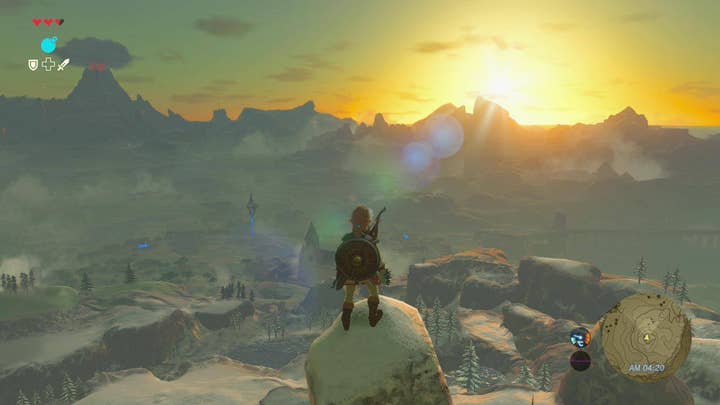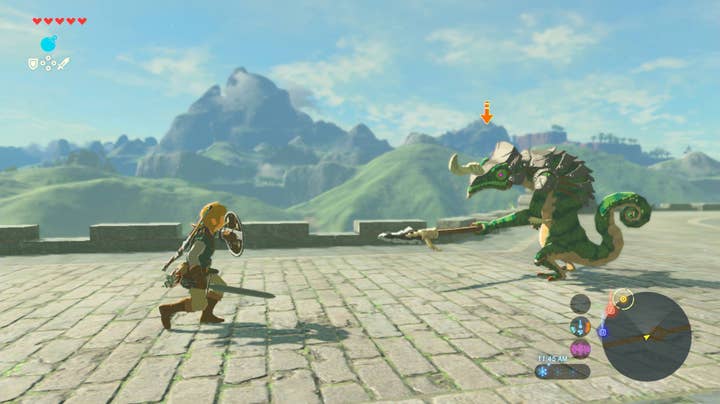The Legend of Zelda: Breath of the Wild: Critical Consensus
Has Nintendo created the greatest game of all time… again?
There's nothing more reliable than a home console Zelda game receiving adulation and praise from critics.
Ever since the franchise stepped into 3D over Christmas 1998, the series has secured average Metacritic scores of 99 (Ocarina of Time), 95 (Majora's Mask), 96 (Wind Waker), 95 (Twilight Princess) and 93 (Skyward Sword).
Yet the strength of conviction behind the almost hyperbolic language which is being used to critique The Legend of Zelda: Breath of Wild marks this one out as something a bit special.
GameSpot describes the title as a "breathtaking masterpiece" in its tagline and ends with the words "the most impressive game Nintendo has ever created".
The Telegraph decides not to just limit the game's quality to Nintendo, simply calling it "one of the finest video games ever made". Trusted Reviews wrote: "If there's a better game out there than Breath of the Wild, I haven't played it."
Meanwhile Destructoid went with: "No game is perfect, but this comes as close as it could get within its genre. The new game to beat in its sector; we're talking pure video game ecstasy."
In total, I counted 14 'masterpieces', 5 'revolutions', 6 'awe-inspirings' and 1 "this is the new blueprint" for open world games.
Nintendo's marketing department is going to have a tough time working out which quotes to put on the posters.
Such is the adulation for the game that some critics have found themselves almost re-evaluating the equally acclaimed Zelda titles of years gone by. The words 'return to form' and 'rejuvenation' are banded around in almost all the articles, yet based on the critical reaction of previous games, there was never any indication that the series was ever out-of-form or in need of revitalising.
"It's debatable whether or not Zelda as a series has been in a rut, and for how long, but it's almost fallen into a predicable pattern," wrote Arthur Gies at Polygon. "An overworld with dungeons that offer items, which in turn allow access to new dungeons and means of traversal. Sure, each game had its own twist - a dark world, lycanthropy, sailing, flight - but there was a predictable path for each."
The implication of all this is that consumers have a Zelda game unlike any they will have played before.
"It's hard to overstate the courage and conviction with which producer Eiji Aonuma, director Hidemaro Fujibayashi and their team have rewritten their own work, and the size of the risk Nintendo has taken with a beloved property.
Eurogamer
"In case it isn't clear, this is a very different Legend of Zelda game," Oli Welsh writes in his Recommended Eurogamer review.
"Until very recently, Nintendo has made its games in a bubble - not that this was necessarily a bad thing, as its priorities were unique, and its standards were uniquely high, but it seemed quite unconcerned by what other game makers were up to. Zelda, one of the most widely admired, finely honed and carefully iterated designs in gaming, was a bubble within this bubble. Its recurring plots about the hero in green echoed its well-worn, smooth patterns of play: get the boomerang, hookshot and bombs, do the dungeons, save the girl. It was a ritual incantation, a myth that ticked like clockwork.
"All that has been either swept aside or remade from first principles. It's hard to overstate the courage and conviction with which producer Eiji Aonuma, director Hidemaro Fujibayashi and their team have rewritten their own work, and the size of the risk Nintendo has taken with a beloved property. Breath of the Wild isn't just the most radical departure from the Zelda tradition in its 30-year history, it's the first Nintendo game that feels like it was made in a world where Half-Life 2, Halo, Grand Theft Auto 3 and Skyrim happened."

Eurogamer isn't the only place that references other open world experiences. The Guardian makes favourable comparisons to The Witcher and Skyrim, yet critics are also at pains to observe that the game remains distinct from them, too.
And the differences from previous Zelda iterations appear numerous. There are no areas cut off from the player, there's no need for the bow to access a temple or a special item to unlock a previously unreachable area of the map. Gamers can now gallop to the game's conclusion right from the outset - although the chances of success are very slim. Indeed, another recurring word throughout the various reviews is the term 'survival'.
"Enemies are not messing around, and while you can go anywhere, that means you can run into things that you perhaps aren't ready for"
God Is A Geek
"It's probably the hardest Zelda to date," insists Adam Cook of God Is A Geek. "Enemies are not messing around, and while you can go anywhere, that means you can run into things that you perhaps aren't ready for. A generous auto-save means that you'll never lose too much progress, but there were many times I would find something that was too strong for me, and almost instantly die. Similarly, the weather can kill you: a lightning storm is one of the most visually arresting moments in the game, but that lightning can strike you dead."
Outside of the challenging combat is the new physics that allow players to complete puzzles and overcome obstacles in ways that hadn't been intended. This isn't especially revolutionary for fans of Rockstar's work, but it is decidedly new for a Nintendo game.

"Early on, I discovered a puzzle shrine containing a small maze," begins Kotaku's Jason Schreier. "Inside that maze was a little ball. The goal, I realized, was to maneuver the ball out of the maze and slide it into a nearby funnel. To do this, I'd have to rotate my Nintendo Switch controller, using motion controls to turn the maze around and let gravity move the ball through each corridor.
"After struggling a few times to solve the puzzle thanks to Newton's dumb laws, I noticed that every time the ball fell, a new one would drop from a canister several feet above the maze. Then I had a wild thought. Just before a new ball dropped, I turned my controller upside down, flipping the maze 180 degrees. There was nothing on the other side, so I now had a nice flat surface on which to roll the ball. I slowly tilted the maze's newly exposed backside and dropped the ball right into the funnel, skipping the maze entirely. Boom. Puzzle solved."
This echoes what Nintendo said during a session at GDC 2017, which talked about players utilising Link's new abilities - such as freezing platforms and moving metallic objects - in ways that were not their intention (such as defeating bosses or crossing gaps).
"Nintendo has crafted a host of systems that are interconnected," explains US Gamer's Mike Williams. "There's an underlying core of physics and chemistry to the world, and on top of that Nintendo has laid combat, cooking, crafting, and more. Where something comes into play may not be readily apparent to the player, but there is a clear plan at work."
Critics are also full of praise of the game's naturalistic style. There's no complex levelling up system, it all ties into the weapons and attire that Link has obtained. Link finds his way in the world not by map, but by climbing up high and identifying where he wants to go.
And most impressive is that the game feels free and open. Almost all reviewers are in agreement that this is a work that feels real.
"It feels natural. It snows on high ground, it is hot in the desert, and rains in the wetland, while wind buffets the coastlines. It feels like a place"
Edge
"We're still not quite sure how Nintendo has done it," admits Edge Magazine. "A land this full of puzzles, innumerate distractions should, by rights, feel contrived, as if it has been built according to metrics, rather than instinct. A shrine here, a stable there, a battle there; lather, rinse and repeat until player reaches objective marker. Yet this colossal game world has been given room to breathe, despite the volume of things to do it contains. And, for all its fantasy, it feels natural. It snows on high ground, it is hot in the desert, and rains in the wetland, while wind buffets the coastlines. It feels like a place, albeit one in which cooking up monster parts yields an elixir that quietens your footsteps, where you can fry an egg on the volcanic ground, and where tree sprites hide behind easily missed, bite-sized puzzles, expanding your inventory when discovered."
So for all the almost embarrassing levels of praise, is there anything wrong with it? Well, "there are some framerate drops, even on TV mode," say Destructoid, and that's something most critics have observed - although they all agree these moments are not regular.
Yet you know that when the lowest score on Metacritic is a 9 that Nintendo has hit upon something special. And it's important that they did. This is the final game for the Wii U, ending that console's disappointing story on a sweet note. Yet more importantly this is the first marker on Switch. A console where analysts have expressed concerns over its price and line-up. Nintendo will hope that with games this good, all of those issues will simply melt away.
After all, if you want to play the greatest adventure game since Ocarina of Time, then there's only really one machine to buy.
"The series has always had something of a fairytale quality to it - its grand landscapes and worlds suggestive of so much more," concludes Matt Castle over at Gamesradar.
"The sight of dawn over a shimmering lake. The rolling plains of Hyrule Field stretched out beneath you. It speaks to our imaginations, calling us on to adventure. What a familiar feeling to look across Hyrule Field at Death Mountain, wondering what it would be like to climb it. What a profound thrill to make that journey in its entirety. It has taken 18 years, but Nintendo has done it again: this is the adventure game to beat."
